Maxim Biller is a German writer and columnist.

Katja Lange-Müller is a German writer living in Berlin. Her works include several short stories and novellas, radio dramas, and dramatic works.

Alice Sophie Schwarzer is a German journalist and prominent feminist. She is founder and publisher of the German feminist journal EMMA. Beginning in France, she became a forerunner of feminist positions against anti-abortion laws, for economic self-sufficiency for women, against pornography, prostitution, female genital mutilation, and for a fair position of women in Islam. She authored many books, including biographies of Romy Schneider, Marion Dönhoff, and herself.

Sibylle Berg is a German-Swiss contemporary author and playwright. They write novels, essays, short fiction, plays, radio plays, and columns. And as of 2024 a member of the European Parliament. Their 17 books have been translated into 30 languages. They have won numerous awards, including the Thüringer Literaturpreis, the Bertolt-Brecht-Literaturpreis, and the Johann-Peter-Hebel-Preis. They have become an iconic figure in German alternative sub-cultures, gaining a large fan base among the LGBT community and the European artistic communities. They live in Switzerland and Israel. Their 2019 work GRM. Brainfuck, a science fiction novel set in a dystopian near future won the Swiss Book Prize and was noticed by The Washington Post, and reached fourth place on the Spiegel Bestseller list, with the sequel, RCE, entering the list as highest entry of the week at place 14. On 1 March 2023 Berg was invited as special guest to open the high-profile Elevate Festival in Graz.

Rahel Sanzara was a German dancer, actress and novelist.

Eva Menasse is an Austrian author and journalist. She has studied history and German literature. Menasse had a successful career as a journalist, writing for the Frankfurter Allgemeine Zeitung in Frankfurt and as a correspondent from Prague and Berlin. She left the paper to write her first novel, Vienna, and now lives and works in Berlin as a freelance author.

Michael Kumpfmüller is a German writer and former journalist.

Thomas Hettche is a German author.
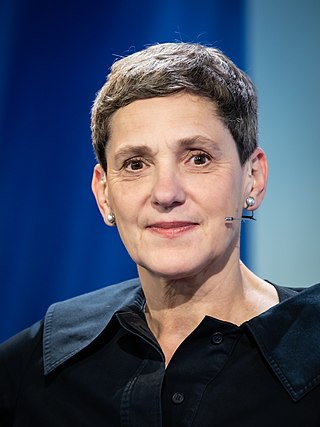
Felicitas Hoppe is a German writer. She received the Georg Büchner Prize in 2012.

Navid Kermani is a German writer and orientalist. He is the author of several novels as well as books and essays on Islam, the Middle East and Christian-Muslim dialogue. He has won numerous prizes for his literary and academic work, including the Peace Prize of the German Publishers' Association on 18 June 2015.
Kranichsteiner Literaturpreis is a literary prize of Germany. The Deutscher Literaturfonds based in Darmstadt has been awarding the prize since 1983. The prize money was raised in 2019 from €20,000 to €30,000. In addition to the main prize, the Kranichsteiner Literaturförderpreis is also awarded. In 2020, the Deutscher Literaturfonds renamed the prize to Großer Preis des Deutschen Literaturfonds and the prize money has been raised to €50,000. It is awarded for an outstanding literary work.
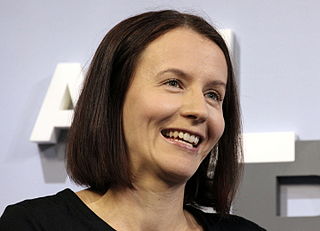
Alina Bronsky, is a Russian-born German writer. Her books have been published in more than 15 countries, including the US and Italy, in both print and audio formats. Her debut novel Scherbenpark (2008), or Broken Glass Park (2010), has received wide critical acclaim.

Volker Weidermann is a German writer and literary critic. He currently works for Frankfurter Allgemeine Zeitung as the literary director and editor of the newspaper's Sunday edition. In 2015, he changed to Der Spiegel.
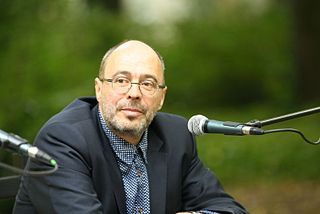
Michael Kleeberg, is a German writer and translator. He studied political science and modern history at the University of Hamburg and visual communication at the Kunsthochschule Hamburg. He lived in Rome, Berlin, Amsterdam and Paris in the 1980s and 1990s. Since 2000 he lives in Berlin as a full-time writer and translator from English and French.
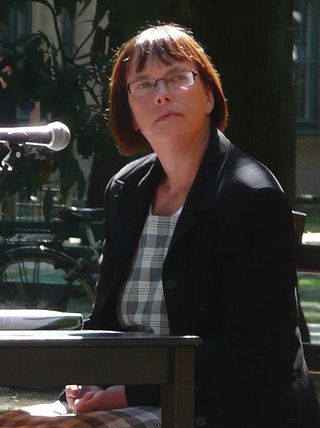
Kathrin Schmidt, is a German writer. She is known both for her poetry and prose.

Klaus Modick is a German author and literary translator.

Volker Kutscher is a German novelist, best known for his Berlin-based Gereon Rath crime series, which serves as the basis for the Sky thriller series Babylon Berlin.
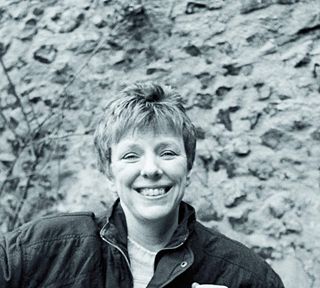
Eva-Ruth Weissweiler is a German writer, musicologist and non fiction writer.

Natascha Wodin is a German writer of Ukrainian origin. She was born in Fürth, Bavaria in 1945 to parents who had been forced labourers under the Nazi regime. She grew up in a camp for displaced persons. Following her mother's suicide, she was raised in a Catholic home for girls. She worked as a telephone operator and stenographer before becoming an interpreter and translator of Russian in the early 1970s.

The Monacensia, or Monacensia in Hildebrandhaus, is the literary archive and a research library of the city of Munich, the capital of Bavaria, Germany, which is devoted to preserving and providing public access to the city's cultural history. The name Monacensia is derived from the Latin name for Munich.


















